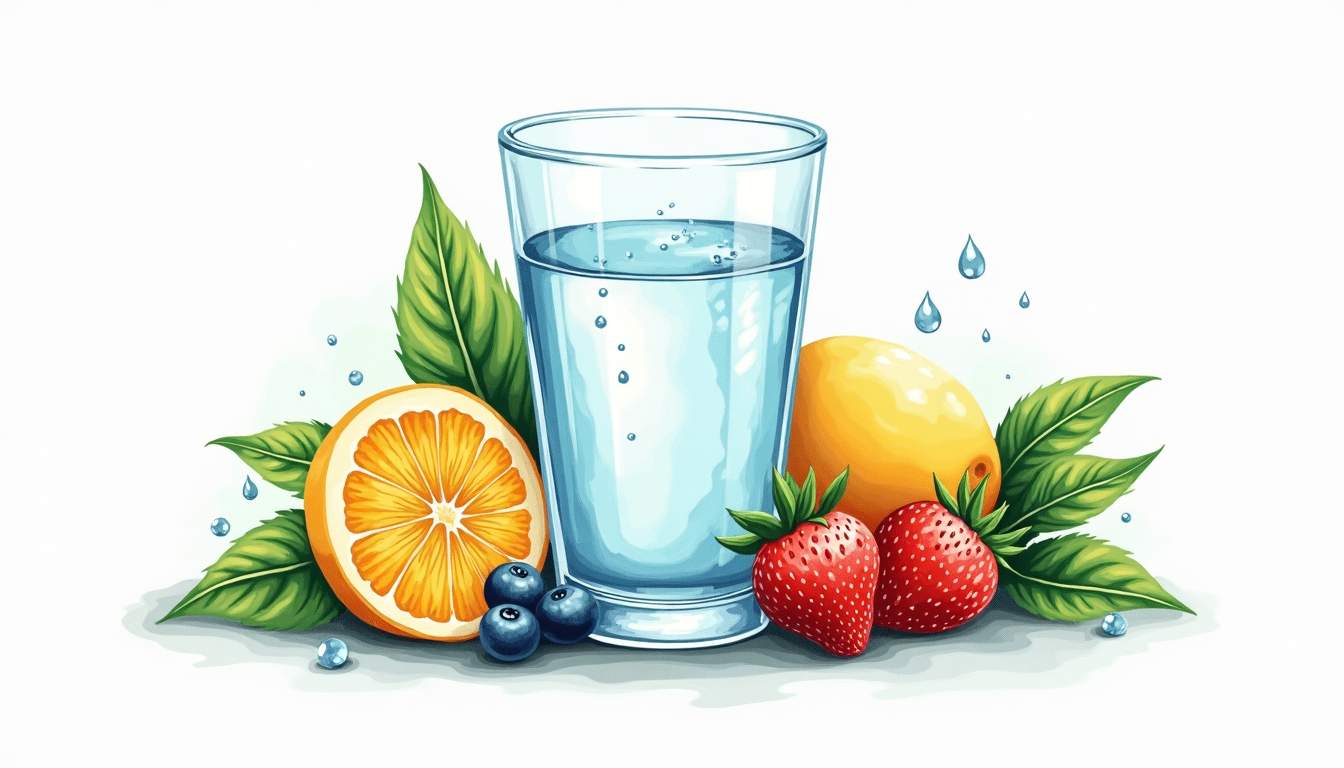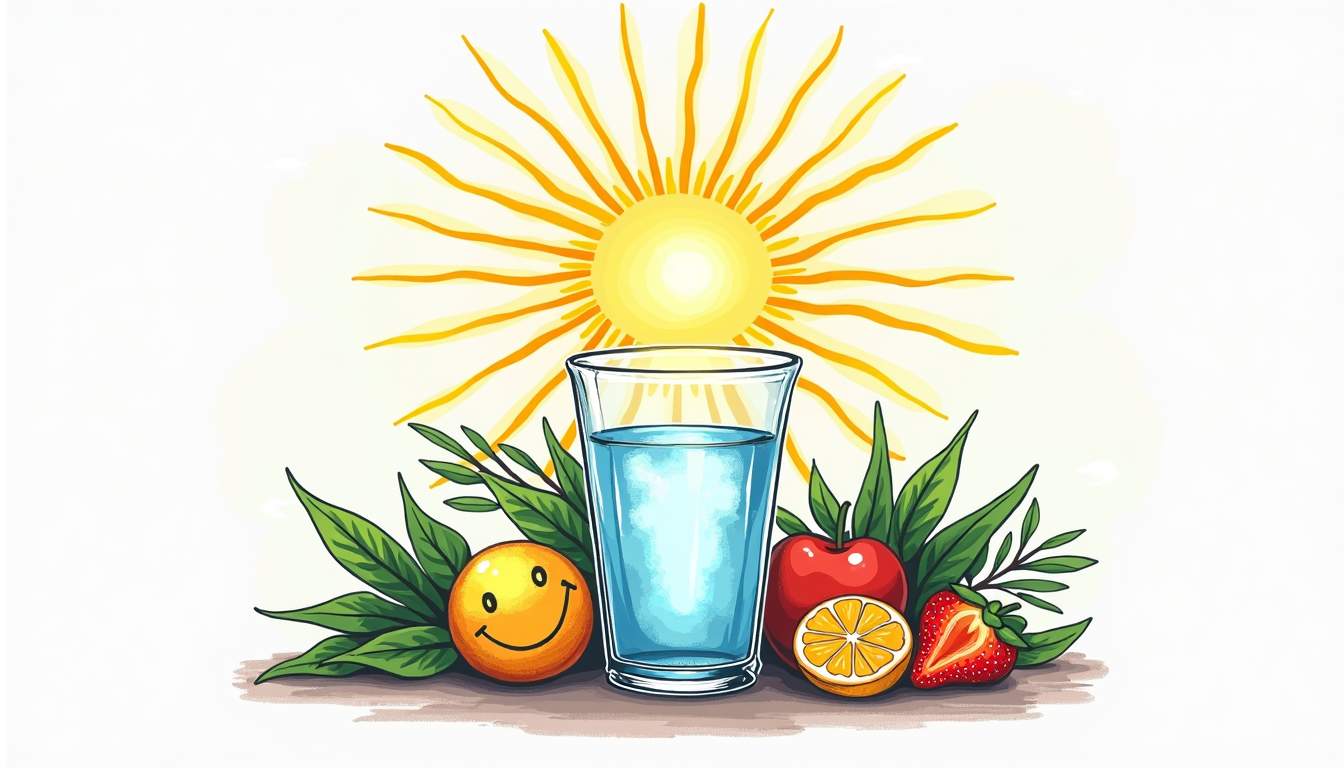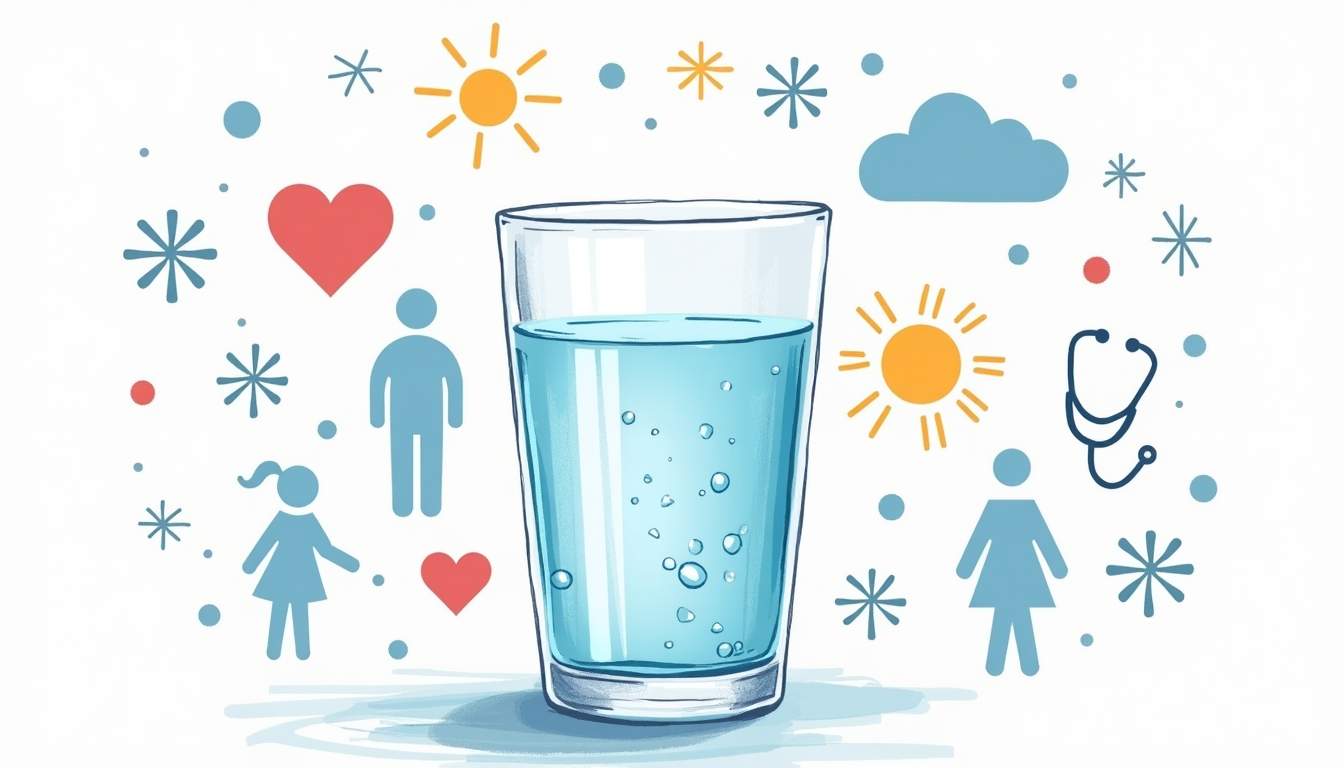
Water is the simplest yet most overlooked foundation of any wellness routine. It supports every cell, regulates body temperature, cushions joints, and carries nutrients where they are needed. Still, many people move through days dehydrated, mistaking thirst for hunger or fatigue. This article explores practical, science-backed ways to make water a deliberate and rewarding part of daily life. It shows how small changes can lead to better mood, energy, and long-term health.
At a basic level, water composes roughly 60% of the human body and participates in almost every physiological process. It transports oxygen and nutrients, aids digestion, lubricates tissues, and helps remove waste through urine, sweat, and bowel movements. Proper hydration supports cognitive function, physical performance, and mood regulation.
Chronic low-level dehydration can disguise itself as headaches, reduced concentration, dry skin, and sluggish digestion. Over time, insufficient water intake can contribute to kidney stones, urinary tract infections, and impaired metabolism. Making water a routine priority is a preventive strategy as much as it is a daily habit.
Beyond these immediate benefits, water plays a crucial role in maintaining the balance of bodily fluids, which are essential for processes such as blood circulation, temperature regulation through sweating, and maintaining electrolyte balance. During exercise or in hot environments, the body's demand for water increases significantly, highlighting the importance of adapting hydration habits to lifestyle and environmental factors.
Furthermore, the quality of the water consumed can influence overall health. Exposure to contaminants like heavy metals, pesticides, or microbes in drinking water can pose risks, making access to clean, safe water equally vital. Advances in water filtration and awareness of hydration needs have driven public health initiatives worldwide to ensure that everyone can benefit from this fundamental resource.
There is no one-size-fits-all answer. Recommendations often include the "8x8" rule—eight 8-ounce glasses per day—or general guidelines of around 2.7 liters for women and 3.7 liters for men from all beverages and food. Those numbers can be useful starting points, but individual needs vary based on activity level, climate, body size, and health conditions.
Listen to bodily cues alongside external measures. Urine color is a practical indicator: pale straw or light yellow usually signifies adequate hydration, while dark yellow or amber can indicate the need for more fluids. Sweat loss during exercise, high heat, or illness may require increased fluid intake and electrolytes to maintain balance.
Water without electrolytes is fine for everyday hydration, but prolonged exertion or heavy sweating depletes sodium, potassium, and magnesium. Electrolyte-containing drinks, oral rehydration solutions, or foods like bananas, leafy greens, and yogurt help restore balance. For most routine situations, a balanced diet and plain water suffice, but electrolytes become essential during extended or intense activity and certain illnesses.
Turning hydration into habit requires more than good intentions. Structure, cues, and accessible options create consistency. Start by placing a reusable water bottle where it will be seen and used: on a work desk, by the kitchen sink, or in a bag. Frequent visual reminders increase the chance of sipping throughout the day.
Set simple, measurable goals. Instead of vague aims like "drink more," aim for one bottle by mid-morning and another by late afternoon. Use alarms or phone reminders sparingly if schedules are erratic. Combine hydration with existing routines—drink a glass after every bathroom break, during each class or meeting break, or before each meal—to anchor the behavior to established patterns.
A water bottle that feels good to hold, fits conveniently into a bag, and keeps water at a preferred temperature is more likely to be used. Insulated bottles keep water cool for hours, which can be more appealing for frequent sipping. Clear or marked bottles that show volume remaining provide visual feedback and help track intake without counting each serving.
Plain water may not be exciting for everyone, and that’s okay. Infusions with citrus slices, cucumber, fresh herbs like mint or basil, or berries add subtle flavor without excessive sugar. These small enhancements can transform water from a chore into a pleasure and increase overall consumption.
For colder months, warm herbal teas are hydrating and comforting. Avoid sugary beverages and limit high-caffeine drinks that can be mildly diuretic in large amounts. Sparkling water offers effervescence for those who miss carbonated sodas but should be consumed without excessive sodium or added sugars.
Timing water intake can influence digestion, sleep, and performance. Drinking a glass of water upon waking helps rehydrate after sleep and can kickstart metabolism. Sipping water before meals aids digestion and may help avoid overeating by promoting a sense of fullness. During exercise, taking small, regular sips prevents gastrointestinal discomfort and maintains steady hydration.
Dehydration affects the brain quickly; even mild fluid loss can reduce attention, impair short-term memory, and increase feelings of anxiety. Staying hydrated helps maintain cognitive function throughout busy workdays or study sessions. Athletes and people who engage in regular exercise will notice improved endurance and recovery with proper fluid balance.

Mood benefits are tied to both physical comfort and the brain’s responsiveness to hydration. When the body is adequately hydrated, fatigue and irritability are less likely to be misinterpreted as emotional states. Enhanced sleep quality often follows improved daytime hydration patterns, which further supports mood regulation.
Drinking water supports healthy weight management by replacing high-calorie beverages and helping control appetite. A glass of water before meals can reduce the amount of food consumed and aid digestion. Hydration also supports metabolic processes that convert food to energy, making it easier to maintain an active lifestyle.
Children and older adults have different hydration challenges. Children may forget to drink during play, while older adults can have a diminished sense of thirst. Both groups benefit from scheduled opportunities to drink and from access to appealing beverages. Monitor vulnerable individuals for signs of dehydration, especially during illness or heat exposure.

Certain health conditions and medications affect fluid needs. Conditions such as kidney disease, heart failure, and some endocrine disorders require tailored fluid recommendations, often with professional guidance. Diuretics and other medications may alter fluid and electrolyte balance, so consult a healthcare provider when in doubt.
Traveling, particularly air travel, can be dehydrating due to cabin humidity and altered schedules. Drinking extra water before and during flights can mitigate dehydration symptoms. High altitude increases fluid loss and stimulates respiration, raising hydration needs. Hot, humid climates increase sweat rates and necessitate more frequent fluid and electrolyte replacement.
A sustainable hydration plan fits seamlessly into daily life rather than becoming another source of stress. Start with reasonable, incremental goals and adjust based on how the body responds. Emphasize whole-food sources of fluids—fruits, vegetables, soups, and herbal teas—alongside regular water intake.

Track progress with simple tools: a marked water bottle, a brief habit tracker, or pairing water with daily rituals. Celebrate small wins, like consistently finishing a bottle by lunchtime or choosing water in place of a sugary drink. These shifts compound over time and contribute to greater energy, resilience, and wellbeing.
Water interacts with sleep, nutrition, movement, and stress management. Better hydration supports workouts, which in turn encourage more movement and improved sleep—both of which influence mental health. Integrate hydration goals within a holistic plan that includes balanced meals, regular physical activity, and restorative rest.
Mindful drinking—paying attention to sensations and needs rather than autopilot sipping—builds awareness and reduces reliance on external cues like caffeine or sugar. Over weeks, mindful hydration fosters a stronger connection to bodily signals and creates a more resilient foundation for long-term health.
Several hydration myths circulate widely. One is that caffeine must always be avoided because it causes dehydration; in reality, moderate caffeine consumption contributes to overall fluid intake for most people. Another myth advises drinking water exclusively at certain times; while timing can be helpful, daily total intake and consistency are the most critical factors.
Overhydration, or hyponatremia, is rare in typical daily life but can occur with excessive fluid intake during endurance events when electrolytes are not replaced. Balance and moderation are key: aim for steady hydration and include electrolyte sources during prolonged exertion.
1. Keep water accessible and make it visually present. 2. Use cues and mini-goals to create routine. 3. Prefer water and water-based beverages over sugary drinks. 4. Adjust intake for activity, heat, and personal factors. 5. Consider electrolytes during heavy sweating or illness.
Water is a foundational, low-cost tool for better health that supports physical performance, mental clarity, and emotional balance. Approaching hydration with intention—by choosing appealing containers, making flavorful but low-calorie options available, and linking drinking to daily routines—turns a simple act into a reliable habit. Small, consistent shifts in how and when water is consumed add up to meaningful improvements.
Adopting a hydration-focused routine is an accessible first step toward broader wellness. It requires no extreme measures, only thoughtful adjustments that honor the body's needs. With regular attention, water becomes more than a background necessity; it becomes an active component of a healthier, more vibrant life.
Just as hydration is essential to your daily wellness, a nourishing environment is key to a fulfilling lifestyle. At Tennessee National, you’ll find a community designed to support your well-being with luxurious homes, scenic nature trails, and world-class amenities including a Greg Norman Signature Golf Course and private marina. Embrace resort-style living where every day offers opportunities to relax, connect, and thrive. Schedule a Private Tour today and start making memories in a place that values your health and happiness.